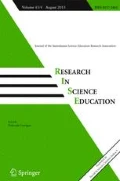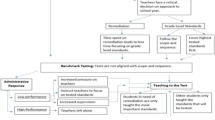Abstract
In 1983, the National Commission on Excellence in Education in the United States issued a report called A Nation at Risk: The Imperative for Educational Reform. This report and other policy initiatives such as the No Child Left Behind Legislation recommended that the individual states institute assessments to hold schools accountable. This research explored the potential impact of impending standardised testing on teaching science in elementary schools in one school district in Florida. We explored the teachers' concerns about the upcoming high-stakes tests in science, possible impact on their curriculum and what changes, if any, will be made in the approach to science teaching and learning in their classrooms. As the teachers look toward the implementation of high-stakes testing in science, they have recognised the need to teach science. This recognition is not borne out of the importance of science learning for elementary school children, but rather out of fear of failure and the effects of tangible rewards or punishments that accompany high-stakes testing. In anticipation, the teachers are preparing to align their teaching to the science standards while aggressively searching for test preparatory materials. Schools are also involved in professional development and structural changes to facilitate teaching of science.
Similar content being viewed by others
References
Abrams, L., & Madaus, G. (2003). The lessons of high-stakes testing. Educational Leadership, 61(3), 31–35.
Amrein, A. L., & Berliner, D. C. (2002). High-stakes testing, uncertainty, and student learning. Education Policy Analysis Archives, 10(18). Retrieved 4 September, 2002, from http://epaa.asu.edu/epaa/v10n18/
Ajazen, I., & Fishbein, M. (1980). Understanding attitudes and predicting social behavior. Englewood Cliffs, NJ: Prentice Hall.
Bandura, A. (1986). Social foundation of thoughts and actions: A social cognitive theory. Englewood Cliffs, NJ: Prentice Hall.
Charlesworth, R., Fleege, P. O., & Weitman, C. J. (1994). Research on the effects of group standardized testing on instruction, pupils, and teachers: New directions for policy. Early Education and Development, 5(3), 195–211.
Finneran, K. (2002). Testy about testing. Issues in Science and Technology Online. Retrieved 4 September, 2002, from http://www.issues.org/issues/19.2/editorsjournal.htm
Florida Department of Education. (1996). Sunshine State Standards. Tallahassee, FL: Florida Department of Education.
Gall, M. D., Borg, W. R., & Gall, J. P. (1996). Educational research (6th ed.). New York: Longman.
Haladyna, T. M., Nolen, S. B., & Haas, N. S. (1991). Raising standardized achievement test scores and the origins of test score pollution. Educational Researcher, 20(1), 2–7.
Haney, J., Lumpe, A., Czerniak, C., & Egan, V. (2002). From beliefs to action: The beliefs and actions of teachers implementing change. Journal of Science Teacher Education, 13(3), 171–187.
Hilliard, A. G. (2000). Excellence in education versus high-stakes standardized testing. Journal of Teacher Education, 51(4), 293–304.
Huber, R. A., & Moore, C. J. (2001). A model for extending hands-on science to be inquiry based. School Science and Mathematics, 101(1), 32–42.
Hurn, C. (1997). The limits and possibilities of schooling (3rd ed.). Boston, MA: Allyn and Bacon.
Jones, M. G., Jones, B. D., Hardin, B., Chapman, L., Yarbrough, T., & Davis, M. (1999). The impact of high-stakes testing on teachers and students in North Carolina. Phi Delta Kappan, 81(3), 199–203.
Kohn, A. (2000). Burnt at high-stakes. Journal of Teacher Education, 51(4), 315–327.
Layman, J. W. (1996). Inquiry and learning: Realizing science standards in the classroom. New York: The College Board.
McClaskey, J. (2001). Who's afraid of the big, bad TAAS? Rethinking our response to standardized testing. English Journal, 91(1), 88–97.
McNeil, L. M. (2000). Contradictions of school reform: Educational cost of standardized testing. New York: Routledge.
Miles, M. B., & Huberman, A. M. (1994). Qualitative data analysis (2nd ed.). Thousand Oaks, CA: Sage.
Mitchell, K. J. (1997). What happens when school reform and accountability testing meet? Theory into Practice, 36(4), 262–266.
National Commission of Excellence in Education. (1983). A Nation at risk: The imperative for educational reform. Washington, DC: US Government Printing Office.
Pajares, F. (1992). Teachers' beliefs and educational research: Cleaning up a messy construct. Review of Educational Research, 62(3), 307–332.
Patton, M. (2002). Qualitative research and evaluation methods (3rd ed.). Thousand Oaks, CA: Sage.
Popham, W. J. (1999). Why standardized tests don't measure educational quality. Educational Leadership, 56(6), 8–17.
Pringle, R. (2001). Standardized testing and accountability: A vision for the future. Florida Educational Leadership, 1(2), 16–21.
Resnick, L. B. (2000). From aptitude to effort: A new foundation for our schools. In L. Abbeduto (Ed.), Taking sides: Clashing views on controversial issues in educational psychology (pp. 206–210). Guilford, CO: McGraw-Hill.
Rigden, J. S. (1999). Training K-6 teachers to teach science. Education Digest, 64(8), 59–61.
Sheldon, K. M., & Biddle, B. J. (2000). Standards and accountability and Perils and pitfalls. In L. Abbeduto (Ed.), Taking sides: Clashing views on controversial issues in educational psychology (pp. 211–220). Guilford, CO: McGraw-Hill.
Shepard, L. (2002). The hazards of high-stakes testing. Issues in Science and Technology Online. Retrieved 4 September, 2002, from http://www.issues.org/issues/19.2/shepard.htm
Smith, M. L., & Fey, P. (2000). Validity and accountability in high-stakes testing. Journal of Teacher Education, 5(15), 334–344.
Smith, P., Banilow, E., McMahon, K., & Weiss, I. (2002). The national survey of science and mathematics education: Trends from 1977 to 2000. Chapel Hill, NC: Horizon Research.
Traub, J. (2002). The test mess. New York Times Magazine. Section 6 (4.7.02).
van Driel, J., Beijaard, D., & Verloop, N. (2001). Professional development and reform in science education: The role of teachers' practical knowledge. Journal of Research in Science Teaching, 38(2), 137–158.
van Manen, M. (1990). Researching lived experience: Human science for an action sensitive pedagogy. Albany, NY: State University of New York.
Author information
Authors and Affiliations
Corresponding author
Rights and permissions
About this article
Cite this article
Pringle, R.M., Martin, S.C. The Potential Impacts of Upcoming High-Stakes Testing on the Teaching of Science in Elementary Classrooms. Res Sci Educ 35, 347–361 (2005). https://doi.org/10.1007/s11165-004-5599-z
Issue Date:
DOI: https://doi.org/10.1007/s11165-004-5599-z



